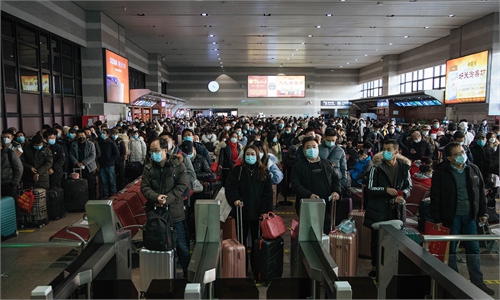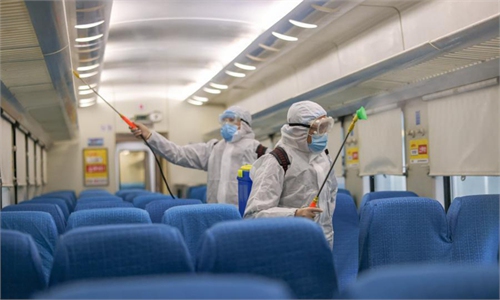TRAVEL / GALLERY
EU urges tighter travel curbs as vaccine campaign hit by delays
The European Commission on Monday urged tougher COVID-19 screening of travelers as it frantically seeks to get to the bottom of vaccine delivery delays jeopardizing its inoculation strategy.
The EU executive called on the 27 member states to impose pre-trip PCR tests for all travelers allowed into the European Union - presently only on "essential" business - and quarantine on arrival if they came from zones where more contagious virus variants were spreading.
It also recommended a similar heightened testing and quarantine regime, where possible, for essential travellers between - or even within - EU countries with high-risk areas classed as "deep red" by the European Center for Disease Prevention and Control.
"The situation in Europe with the new variants have led us to take difficult but necessary decisions. We need to keep safe and discourage non-essential travel," Commission chief Ursula von der Leyen tweeted.
The recommendations added even more restrictions to the EU's cherished passport-free Schengen zone, underscoring Brussels' deepening worries about a looming third wave of the coronavirus pandemic made far worse by the variants.
The sense of urgency has escalated with British-Swedish pharmaceutical group AstraZeneca announcing last week it will not meet its COVID-19 vaccine delivery commitments to the EU.
That came a week after US group Pfizer said its doses, developed with German partner BioNTech and made in Europe in a Belgian factory, would also be delayed.
Together, those announcements risked upending vaccination programs that depend on people getting two jabs weeks apart. That would potentially trash Von der Leyen's pledge made just a week ago to inoculate 70 percent of adults in the EU by the end of August.
It would also have a knock-on effect for the EU's plan to contribute excess doses to a World Health Organization-led COVAX initiative to provide vaccines to poorer nations around the world.
Von der Leyen spoke with AstraZeneca CEO Pascal Soriot early on Monday, and member states were pressing the company for answers and a rapid solution in further talks.
AstraZeneca last week blamed "reduced yields" in its European supply chain for the dose delay. The European Commission did not elaborate on the purported problem or what recourses exist in the contract, but a spokesperson said, "The Commission expects contractual obligations to be met. This is crucial for the safety of our citizens."
The EU has authorized two vaccines for jabs, the BioNTech/Pfizer and Moderna ones, and is poised to do so with AstraZeneca with the understanding that production and distribution would allow for immediate rollout.
On the EU's proposed travel restrictions, the Commissioner for Justice, Didier Reynders, noted that member states retained responsibility in health matters and travel within their territories.
But, he said, the new variants with high infectivity - coming from Britain, South Africa and Brazil - meant "there is an urgent need to reduce the risk of travel-related infections to lessen the burden on overstretched healthcare systems."
Fellow Commissioner Ylva Johansson, in charge of EU internal affairs, said that the bloc was still moving toward a European passenger locator form - a document tracing travelers' movements and their exposure to COVID-19 risk - that had been promised to be operational last month.
The EU executive called on the 27 member states to impose pre-trip PCR tests for all travelers allowed into the European Union - presently only on "essential" business - and quarantine on arrival if they came from zones where more contagious virus variants were spreading.
It also recommended a similar heightened testing and quarantine regime, where possible, for essential travellers between - or even within - EU countries with high-risk areas classed as "deep red" by the European Center for Disease Prevention and Control.
"The situation in Europe with the new variants have led us to take difficult but necessary decisions. We need to keep safe and discourage non-essential travel," Commission chief Ursula von der Leyen tweeted.
The recommendations added even more restrictions to the EU's cherished passport-free Schengen zone, underscoring Brussels' deepening worries about a looming third wave of the coronavirus pandemic made far worse by the variants.
The sense of urgency has escalated with British-Swedish pharmaceutical group AstraZeneca announcing last week it will not meet its COVID-19 vaccine delivery commitments to the EU.
That came a week after US group Pfizer said its doses, developed with German partner BioNTech and made in Europe in a Belgian factory, would also be delayed.
Together, those announcements risked upending vaccination programs that depend on people getting two jabs weeks apart. That would potentially trash Von der Leyen's pledge made just a week ago to inoculate 70 percent of adults in the EU by the end of August.
It would also have a knock-on effect for the EU's plan to contribute excess doses to a World Health Organization-led COVAX initiative to provide vaccines to poorer nations around the world.
Von der Leyen spoke with AstraZeneca CEO Pascal Soriot early on Monday, and member states were pressing the company for answers and a rapid solution in further talks.
AstraZeneca last week blamed "reduced yields" in its European supply chain for the dose delay. The European Commission did not elaborate on the purported problem or what recourses exist in the contract, but a spokesperson said, "The Commission expects contractual obligations to be met. This is crucial for the safety of our citizens."
The EU has authorized two vaccines for jabs, the BioNTech/Pfizer and Moderna ones, and is poised to do so with AstraZeneca with the understanding that production and distribution would allow for immediate rollout.
On the EU's proposed travel restrictions, the Commissioner for Justice, Didier Reynders, noted that member states retained responsibility in health matters and travel within their territories.
But, he said, the new variants with high infectivity - coming from Britain, South Africa and Brazil - meant "there is an urgent need to reduce the risk of travel-related infections to lessen the burden on overstretched healthcare systems."
Fellow Commissioner Ylva Johansson, in charge of EU internal affairs, said that the bloc was still moving toward a European passenger locator form - a document tracing travelers' movements and their exposure to COVID-19 risk - that had been promised to be operational last month.



